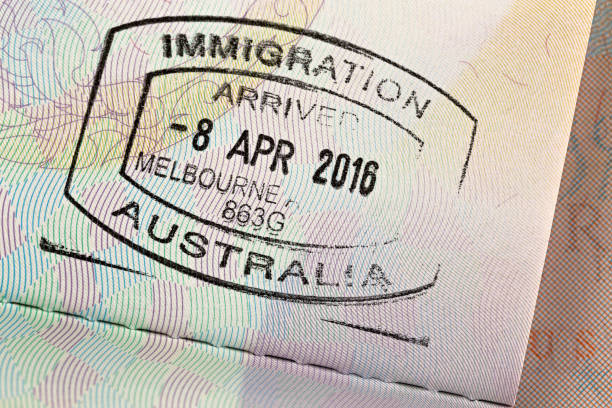What are the rules of visa applications? There are various rules of visa applications. Part 2, Subdivision AB, Sections 51A – 64 of the Migration Act 1958 (the Act) contains the rules of visa applications in Australia. It specifically includes the code of procedure for dealing fairly, efficiently and quickly with visa applications. This article discusses the rules of visa applications.
Section 51A: Natural Justice Hearing Rule
Under Section 51A, Subdivision AB is an exhaustive statement of the requirements of the natural justice hearing rule in relation to the matters it deals with.
Section 52: Communication with Minister
Under Section 52, a visa applicant or interested person must communicate with the Minister in the prescribed way. The regulations may prescribe different ways of communicating and specify the circumstances when communication is to be in a particular way. A way of communicating includes any associated process for authenticating identity.
If the applicant or interested person purports to communicate anything to the Minister in a way that is not the prescribed way, the communication is taken not to have been received unless the Minister in fact receives it.
Additionally, a visa applicant must tell the Minister the address at which the applicant intends to live while the Department deals with the application. If the applicant proposes to change the address at which he or she intends to live for a period of 14 days or more, the applicant must tell the Minister the address and the period of proposed residence.
An “interested person” means a person who wants, or who is requested, to give information about the applicant to the Minister.
Section 54: Minister Must Have Regard to All Information
Under Section 54, the Minister must, in deciding whether to grant or refuse to grant a visa, have regard to all of the information in the application.
Information is in an application if the information is:
- set out in the application,
- in a document attached to the application, or
- given under Section 55.
A decision to grant or refuse to grant a visa may be made without giving the applicant an opportunity to make oral or written submissions.
Section 55: Applicant May Give Further Information
Under Section 55, until the Minister has made a decision whether to grant or refuse to grant a visa, the applicant may give the Minister any additional relevant information and the Minister must have regard to that information in making the decision.
Section 56: Minister May Require Further Information
Under Section 56, in considering an application for a visa, the Minister may, if he or she wants to, get any information that he or she considers relevant and have regard to that information in making the decision whether to grant or refuse the visa.

Section 57: Certain Information Must Be Given to Applicant
Under Section 57, relevant information means information (other than non-disclosable information) that the Minister considers:
- would be the reason, or part of the reason:
- for refusing to grant a visa, or
- for deciding that the applicant is an excluded fast track review applicant, and
- is specifically about the applicant or another person and is not just about a class of persons of which the applicant or other person is a member.
The Minister must:
- give particulars of the relevant information to the applicant in the way that the Minister considers appropriate in the circumstances,
- ensure, as far as is reasonably practicable, that the applicant understands why it is relevant to consideration of the application, and
- invite the applicant to comment on it.
Section 58: Invitation to Give Further Information or Comments
Under Section 58, if a person is invited to give additional information or to comment on information, the invitation must specify whether the additional information or the comments may be given:
- in writing,
- at an interview between the applicant and an officer, or
- by telephone.
Section 59: Interviews
Under Section 59, an applicant must make every reasonable effort to be available for, and attend, an interview. Section 58 and Section 59 do not mean that the Minister cannot obtain information from an applicant by telephone or in any other way.
Section 60: Medical Examination
Under Section 60, if the health or physical or mental condition of an applicant for a visa is relevant to the grant of a visa, the Minister may require the applicant to be examined by a specified person,
The specified person must be a person qualified to determine the applicant’s health, physical condition or mental condition. Furthermore, an applicant must make every reasonable effort to be available for, and attend, an examination.
Section 61: Prescribed Periods
Under Section 61, the regulations may prescribe different limits relating to that step and specify when that specified limit is to apply, which, without limiting the generality of the power, may be to:
- applications for a visa of a specified class,
- applications in specified circumstances,
- applicants in a specified class of persons, or
- applicants in a specified class of persons in specified circumstances.
Section 62: Failure to Receive Information Does Not Require Action
Under Section 62, if an applicant for a visa:
- is invited to give additional information or comment, and
- does not give the information or comments before the time for giving it has passed,
the Minister may make a decision to grant or refuse to grant the visa without taking any action to obtain the additional information or the applicant’s views on the information.
Section 63: When Decision About Visa May Be Made
Under Section 63, the Minister may grant or refuse to grant a visa at any time after the applicant has made the application. Furthermore, the Minister must not to refuse to grant a visa after inviting the applicant to give information or comment, and before whichever of the following happens first:
- the applicant gives the information,
- the applicant tells the Minister that the applicant does not wish to give the information, does not have it, or does not wish to comment, or
- the time during which the applicant may give information or comments ends.
Additionally, the Minister must not refuse to grant a visa after giving a notice under Section 64 and before whichever of the following happens first:
- the applicant pays the visa application charge,
- the applicant tells the Minister that the applicant does not intend to pay the visa application charge, or
- the end of the period set out in the notice.
Section 64: Notice That Visa Application Charge Is Payable
Section 64 applies to a valid application for a visa if the Minister, after considering the application, has made an assessment that:
- the applicant has satisfied health criteria for it (if any); and
- the applicant has satisfied other criteria for it as prescribed by the Act or the regulations.
If an amount of visa application charge is unpaid, the Minister must give the applicant written notice stating that:
- an amount of visa application charge is payable within the prescribed period,
- subject to the regulations providing otherwise, a Minister cannot grant the visa unless the applicant pays the amount, and
- the Minister may refuse to grant the visa unless the applicant pays the amount within the prescribed period.

Seeking Legal Advice on Rules of Visa Applications
Rules of visa applications can be quite technical. A simple or honest mistake can possibly lead to the refusal of a visa application. Thus, we highly advise you to seek legal advice on the rules of visa applications.
JB Solicitors has a leading team of expert immigration lawyers that can help with your situation. We can offer you legal advice on completing a visa application and guide you through the rules of visa applicationsDo you have any more questions regarding the rules of visa applications?
Contact us today.
